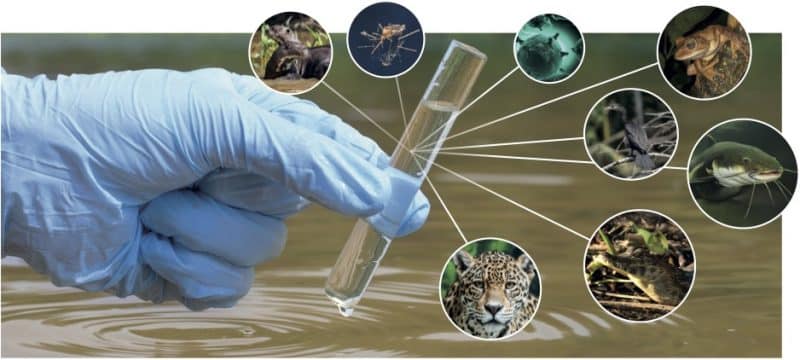About Environmental DNA
- eDNA is DNA shed by all organisms into their surroundings through natural processes during their lifetime or after death.
- Source: It originates from cellular material shed by organisms (via skin, excrement, etc.) into aquatic or terrestrial environments that can be sampled and monitored using new molecular methods.
Key points about new method
- The new non-invasive method can assess the total biodiversity of any ecosystem by sequencing the DNA fragments found in the environmental samples such as water, soil or air.
- This method can detect all kinds of organisms, including viruses, bacteria, archaea, and eukaryotes such as fungi, plants, insects, birds, fish and other animals.
- This method requires just a few litres of water sample without any direct capture or counting of species.
- The researchers filter out eDNA from environmental samples, read their sequences, and thus, identify the source of the eDNA.
Significance
- Such methodology is important for the early detection of invasive species as well as the detection of rare and cryptic species.
- eDNA can also reveal the presence of human remains
- The new method is cheaper, faster, and highly scalable to large freshwater and marine ecosystems which can help in monitoring and conserving the rich biodiversity of our country.
Q1) What is DNA?
The deoxyribonucleic acid is a molecule found in the cells of all living organisms. It serves as the genetic blueprint for the development, functioning, growth, and reproduction of living organisms. DNA carries the instructions necessary for the construction and regulation of the various components of an organism, from proteins to cells and entire organisms.
Source: Hyderabad-based researchers develop new eDNA sequencing method to assess biodiversity
Last updated on July, 2025
→ UPSC Notification 2025 was released on 22nd January 2025.
→ UPSC Prelims Result 2025 is out now for the CSE held on 25 May 2025.
→ UPSC Prelims Question Paper 2025 and Unofficial Prelims Answer Key 2025 are available now.
→ UPSC Calendar 2026 is released on 15th May, 2025.
→ The UPSC Vacancy 2025 were released 1129, out of which 979 were for UPSC CSE and remaining 150 are for UPSC IFoS.
→ UPSC Mains 2025 will be conducted on 22nd August 2025.
→ UPSC Prelims 2026 will be conducted on 24th May, 2026 & UPSC Mains 2026 will be conducted on 21st August 2026.
→ The UPSC Selection Process is of 3 stages-Prelims, Mains and Interview.
→ UPSC Result 2024 is released with latest UPSC Marksheet 2024. Check Now!
→ UPSC Toppers List 2024 is released now. Shakti Dubey is UPSC AIR 1 2024 Topper.
→ Also check Best IAS Coaching in Delhi















